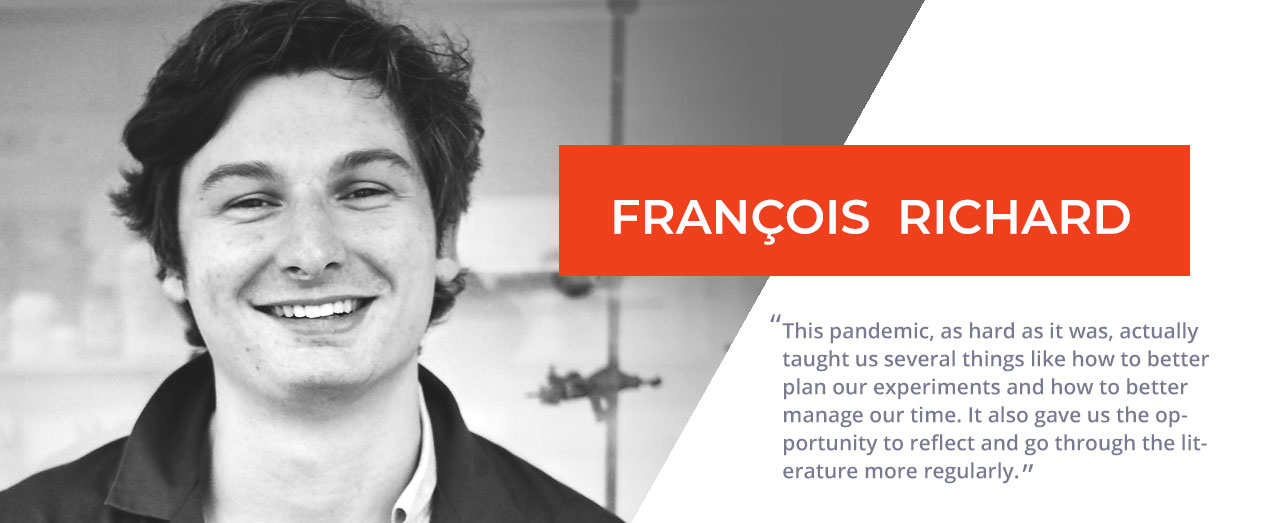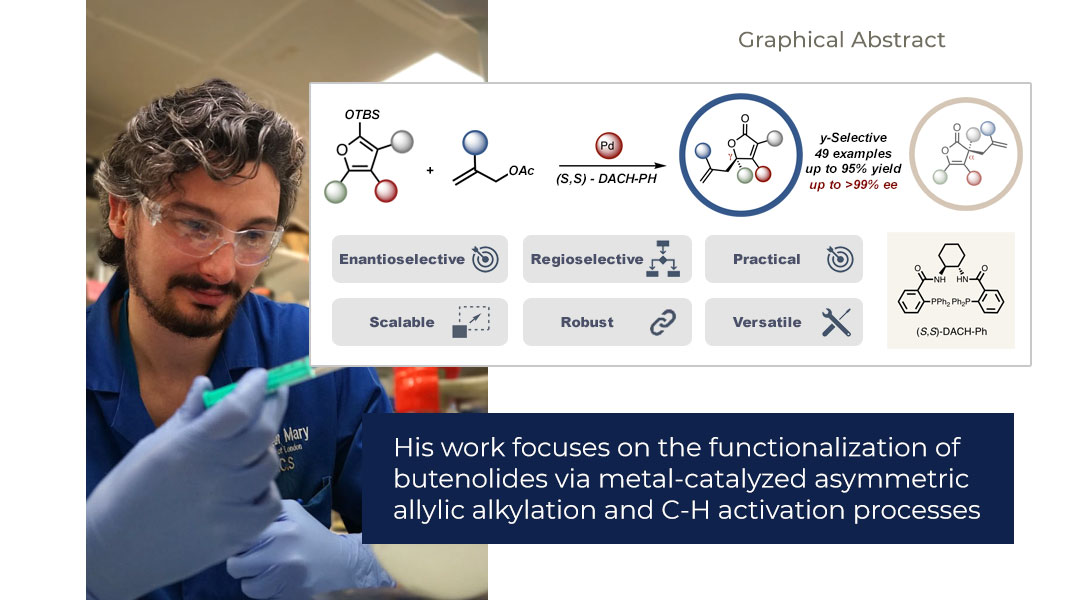
François, a graduate in chemistry, is a final year PhD student at Queen Mary University of London working under the supervision of Prof. Stellios Arseniyadis . His work focuses on the functionalization of butenolides via metal-catalyzed asymmetric allylic alkylation and C-H activation processes.
Discovering the researcher withinPhD applicants are believed to enter into a doctorate program with different motives: willingness to improve their credibility and career prospects, to manifest their passion for research, and to drive their intellectual curiosity to discover and learn new things. What is your story? What has influenced your career choice? Are there any inspirations you can point to?
To start with, I wasn’t a very good student back in high school. I encountered numerous difficulties but I remember that I always loved to understand how things worked or why the world was made this way and not another, and I always had a somehow creative side. Yet, I knew that I wasn’t really made for long studies. With that in mind, I went for a technical degree in Chemistry at the Institut Universtaire de Technologie (IUT) of Orsay in France. Then, something I never expected would happen actually happened: I was immediately drawn by synthetic organic chemistry. I enjoyed learning more and more about it, so much that by the end of Year 2, I decided to pursue my studies in the field by joining the Ecole Nationale Supérieure de Chimie de Montpellier (ENSCM), where I completed my Bachelor and Master in chemistry through a French 'diplôme d’ingénieur'. But still, I strived to learn more, and that is how I decided to enroll in a PhD program. I’ve always been grateful to my mentors who took the time to enlighten me, and give me precious advice like "start to apply for PhD positions early", "meet the supervisor you would like to work with and talk to the members of his/her group". This is how I met Dr. Arseniyadis and his team.
Big picture of your researchWhat challenges are driving your research within that larger question? Why does this study matter?
My main project has been focused on developing new synthetic tools to readily access biologically relevant compounds. In particular, I worked on the palladium-catalyzed asymmetric allylic alkylation of butenolides. The original Tsuji-Trost allylation was developed in the 70’s, and even if major advances have been made over the years, there is still a lot to explore. In this context, we developed an unprecedented, highly enantioselective and exclusively-selective allylation of siloxyfurans that provides a straightforward access to virtually any substituted butenolide, independently of the substitution pattern around the ring. The method was ultimately applied in the total synthesis and stereochemical elucidation of three O terpenoidal natural products, namely excavacoumarin B, D, and E.

Science in lockdown
Across the globe, COVID-19 has curtailed academic research to great extent with research laboratories shuttered and fieldwork largely suspended. How is it really like to do research amid COVID-19? What are the lessons learned during this period?
When COVID-19 hit, research at Queen Mary had to be reorganized. Resources were minimized and the access to equipment was reduced. On our first reopening, we came back to the labs in shifts, but luckily things went back to normal relatively quickly. This pandemic, as hard as it was, actually taught us several things like how to better plan our experiments and how to better manage our time. It also gave us the opportunity to reflect and go through the literature more regularly.
Life outside of workHaving a healthy work-life balance is imperative that takes care of the overall wellness of the individual and boosts one’s productivity. Is there such a thing as work-life balance for a research scholar? How do you motivate yourself to keep going?
A PhD is a full commitment. Among the discussions that I had prior to starting my PhD, I will always remember this advice "Remember this is not a sprint, it’s a marathon", meaning that efforts had to be balanced in order to be able to reach the finish line. These scholar years require devotion, and it is easy to forget the rest when working in the lab. However, resting, physically and mentally, has to be part of one’s plan to boost productivity. In my opinion, having a regular activity or hobby can offer the refreshing escape we need – personally, practicing Brazilian jiu-jitsu and exercising has helped me a lot.
Thriving, and not just survivingEmbarking on a PhD is life’s big decision. It may not always be smooth sailing. Sometimes rewarding and sometimes test your patience. What are those lessons you have learned along this journey so far?
Being a research scholar is full of adventures. Some roads lead nowhere while others are luckily extremely fruitful. Our everyday life is made of ups and downs. For instance, I have been spending a considerable amount of time trying to synthesize one of my natural products. After months of investigation, we understood that the route we had been on was a dead-end. It was emotionally difficult at the time but resilience was key. We started from scratch and came up with an alternative strategy, which ultimately worked. All our efforts were finally rewarded.
Piyushi Nautiyal,
Science communication and Outreach Manager, India UK ISCC